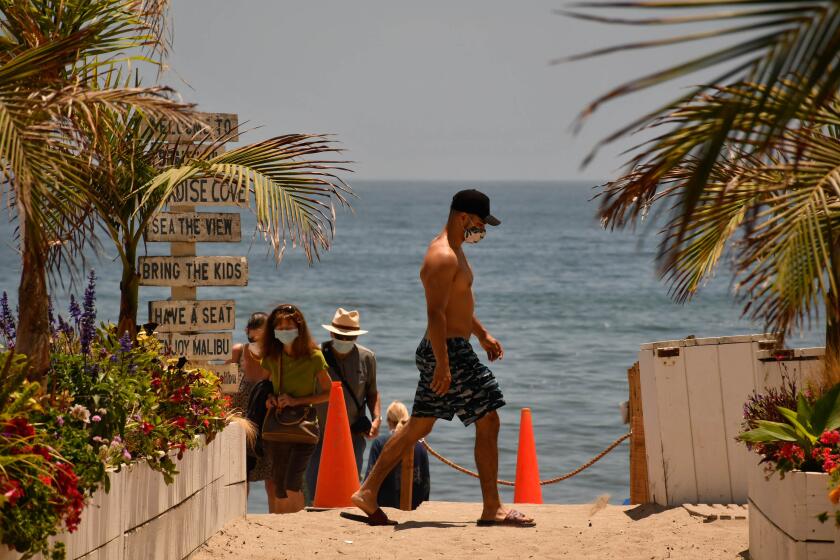Hiking Mt. Whitney during (what feels like) the end of the world
- Share via
First came the coronavirus closure. Then came an earthquake-triggered rockslide that shut down Whitney Portal.
As the days ticked closer to July 5, our permit date to hike Mt. Whitney, I was sure my boyfriend, Matt, and I should make other socially distant plans for the long Fourth of July weekend. Lo and behold, just a few days before our hike, Mt. Whitney opened for the season. We had done enough physical activity to ready ourselves to tackle the tallest mountain in the lower 48 states; it was time to mentally prepare.
Over the course of the past few virus-dominated months, Matt and I trekked up Mt. Wilson (5,715 feet), Cucamonga Peak (8,858 feet) and San Gorgonio Mountain (11,503 feet) to prepare for the punishing day hike to Mt. Whitney’s roughly 14,494 foot-high peak.
Get The Wild newsletter.
The essential weekly guide to enjoying the outdoors in Southern California. Insider tips on the best of our beaches, trails, parks, deserts, forests and mountains.
You may occasionally receive promotional content from the Los Angeles Times.
Early on in my pre-hike research, I learned training is essential (for a rundown on the dangers of hiking Whitney unprepared, read this bone-chilling Outside story). Still, we hoped our efforts would be enough to tackle the 11 miles of steep uphill that would take us 6,000 feet above our starting point. If nothing else, our training regimen was a great distraction from the virus-related horrors unfolding in Southern California.
One last-minute trip to REI and 220 miles later, we found ourselves in Lone Pine, Calif., and on our way to the Whitney Portal on July 4, one day prior to our hike. As we drove through the parking lots, I noticed only half of the day trippers and campers were wearing masks, triggering that now-familiar feeling of nervousness I feel around large groups of mask-less people.
Despite our mask anxiety, we hit the Mt. Whitney Trail, covering just a few miles to help us acclimate to high elevation. My nervousness quickly faded — nearly every hiker we passed was wearing a mask, even in the baking afternoon heat — and turned into a jumpy excitement for the next day’s adventure.
After a takeout pasta dinner in Lone Pine, Matt and I fell asleep early. By 3:30 a.m. the next morning, we were back on the trail, for real this time.
Matt was especially nervous about hiking in the dark, but between our headlamps and the almost-full moon, visibility wasn’t difficult. We arrived at Lone Pine Lake, still more than eight miles from the summit, at dawn. As I watched the lake turn a preternatural golden in the early light, it hit me: This is why people hike Mt. Whitney.
The beauty of the Sierra left us slack-jawed throughout the morning, from spotting a few deer enjoying their breakfast at Mirror Lake to watching a snow-fed waterfall empty into a meadow of purple flowers. By midmorning, we had reached Trail Camp at 12,000 feet, ready to hike up the dreaded 99 switchbacks (I didn’t count them, but it felt like more).
With indoor options reduced, outdoor spaces get renewed attention in L.A. and beyond
Confession: At this point, Matt and I had long given up wearing masks. Right or wrong, hiking uphill at high altitude with a mask on felt like a truly Herculean effort. Because every other hiker we saw at this point had given up on masks as well, we kept our bandannas tied around our necks in case anyone got within six feet of us, as hikers are asked to do. Fortunately, there was space aplenty, and we never needed to pull up our bandannas.
Though the threat of coronavirus never quite left us, our brains pivoted to a more immediate danger about halfway up the switchbacks: falling rocks. Careless hikers above us kicked loose some rocks that hurtled down when we stopped for a break. Matt and I had to sprint several yards away to get out of the mini rockfall. Word to my fellow hikers: Keep your eyes and ears on high alert for falling rocks at all times.
Four hours of leg-burning trekking later, we reached the summit and were left “staring into the heart of the Sierra,” as The Wild editor Mary Forgione so beautifully put it.
Yes, as a newly minted Whitney hiker, I would have done a few things differently. (Mainly, I would have split the hike over two days and stayed overnight at Trail Camp.) But the feeling we had escaped from our complicated, contagion-filled world was powerful, even if it was an illusion we knew would shatter upon returning to sea level.
After soaking in the 360-degree summit view and snapping a few pictures, I glanced at my phone and noticed I miraculously had a few signal bars; most of the mountain is a no-service zone. I decided to call my grandmother for her 92nd birthday. After wishing her a happy birthday, I told her I was standing at the highest point in the lower 48 states. “That just makes me breathless,” she said. I looked into the abyss. “Me too, Nana,” I replied, losing service again.
More to Read
Sign up for The Wild
We’ll help you find the best places to hike, bike and run, as well as the perfect silent spots for meditation and yoga.
You may occasionally receive promotional content from the Los Angeles Times.








